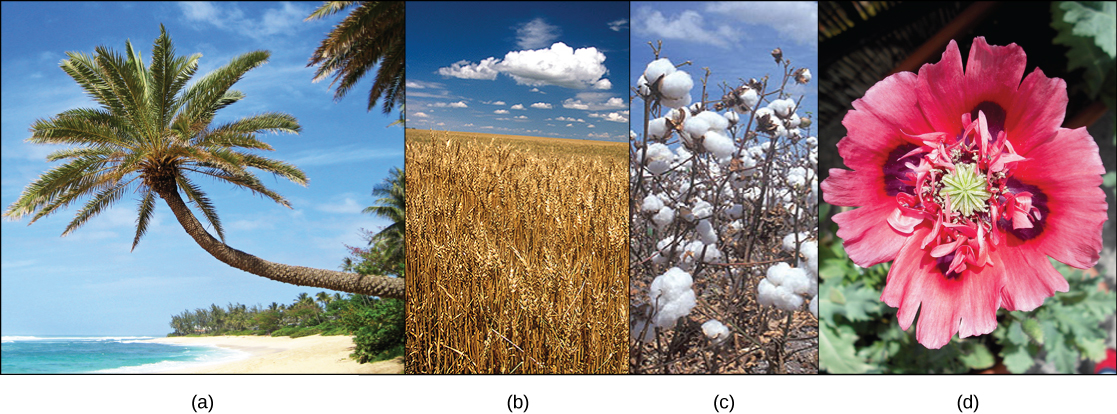| << Chapter < Page | Chapter >> Page > |

The lush palms on tropical shorelines do not depend on water for the dispersal of their pollen, fertilization, or the survival of the zygote—unlike mosses, liverworts, and ferns of the terrain. Seed plants, such as palms, have broken free from the need to rely on water for their reproductive needs. They play an integral role in all aspects of life on the planet, shaping the physical terrain, influencing the climate, and maintaining life as we know it. For millennia, human societies have depended on seed plants for nutrition and medicinal compounds: and more recently, for industrial by-products, such as timber and paper, dyes, and textiles. Palms provide materials including rattans, oils, and dates. Wheat is grown to feed both human and animal populations. The fruit of the cotton boll flower is harvested as a boll, with its fibers transformed into clothing or pulp for paper. The showy opium poppy is valued both as an ornamental flower and as a source of potent opiate compounds.
The first plants to colonize land were most likely closely related to modern day mosses (bryophytes) and are thought to have appeared about 500 million years ago. They were followed by liverworts (also bryophytes) and primitive vascular plants—the pterophytes—from which modern ferns are derived. The lifecycle of bryophytes and pterophytes is characterized by the alternation of generations, like gymnosperms and angiosperms; what sets bryophytes and pterophytes apart from gymnosperms and angiosperms is their reproductive requirement for water. The completion of the bryophyte and pterophyte life cycle requires water because the male gametophyte releases sperm, which must swim—propelled by their flagella—to reach and fertilize the female gamete or egg. After fertilization, the zygote matures and grows into a sporophyte, which in turn will form sporangia or "spore vessels." In the sporangia, mother cells undergo meiosis and produce the haploid spores. Release of spores in a suitable environment will lead to germination and a new generation of gametophytes.

Notification Switch
Would you like to follow the 'Bi 101 for lbcc ilearn campus' conversation and receive update notifications?